Subsections of (Primochaetus)
Chaetonotus (P. ) acanthocephalus
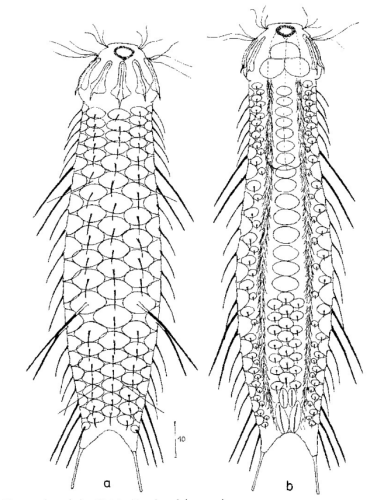
100 µm - 148 µm
Width:
28 µm - 30 µm
Width of the head ( five-lobed ):
µm
Length of the furca:
16 µm - 20 µm
Adhessive tubes:
75% of furca
Pharyx ( cylindrical ):
37 µm - 40 µm
Diameter of the mouth ( around ):
6.5 - 8 µm
Dorsal scales:
5 rows of 15-18 transverse oval scales (5 x 10 µm) each, not touching; on head dorsally and laterally 5-7 characteristic spiny scales; small spines 6-7 µm; groups of large spines 8-22 µm.
Ventral scales:
Ventral intermediate field on head 3 touching plates; otherwise elliptical plates; in gut region sometimes 3 deer of smaller elliptical plates.
Oecology:
Bog waters, rare, very variable
Particularities:
very variable with respect to spine size - possibly a number of subspecies
A very rare and strange ventral hardy is the nearly rotund Chaetonotus (P.) acanthocephalus with its irregular spination and large, round scales:
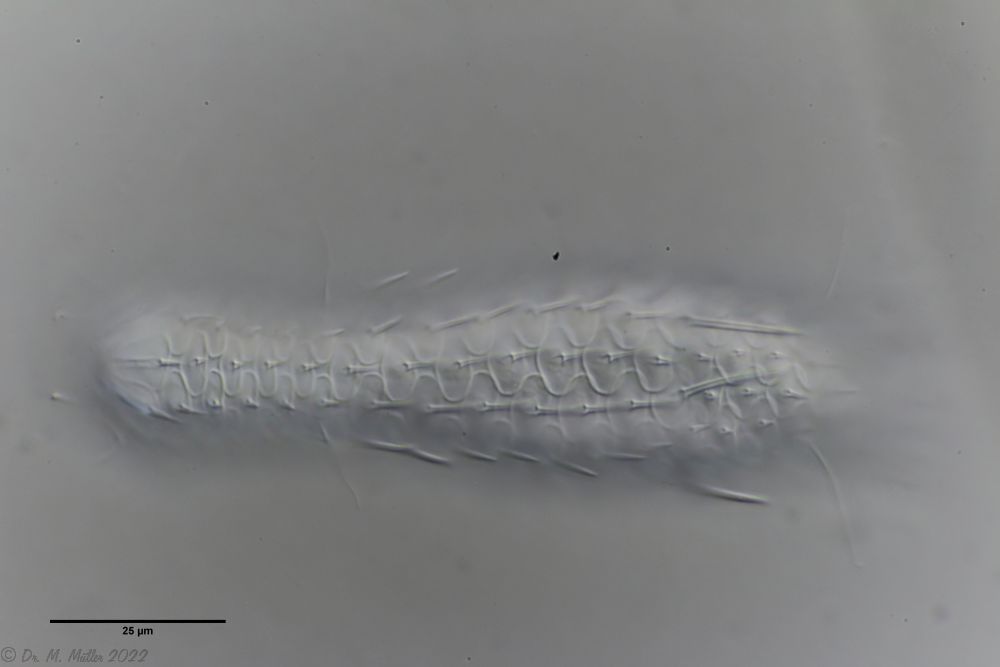 Ch. acanthocephalus: focus on the dorsal scale
Ch. acanthocephalus: focus on the dorsal scale
Ventrally, the animal bears large cuticular plates on the head that change to round, short-spined scales toward the posterior end:
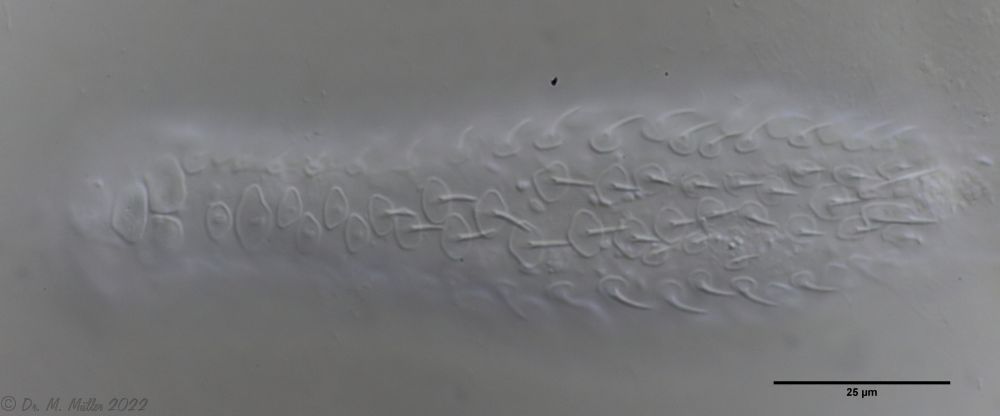 Ch. acanthocephalus: ventral
Ch. acanthocephalus: ventral
If the animal is macerated with glacial acetic acid, the scale shape typical for the subgenus Primochaetus becomes particularly clear:
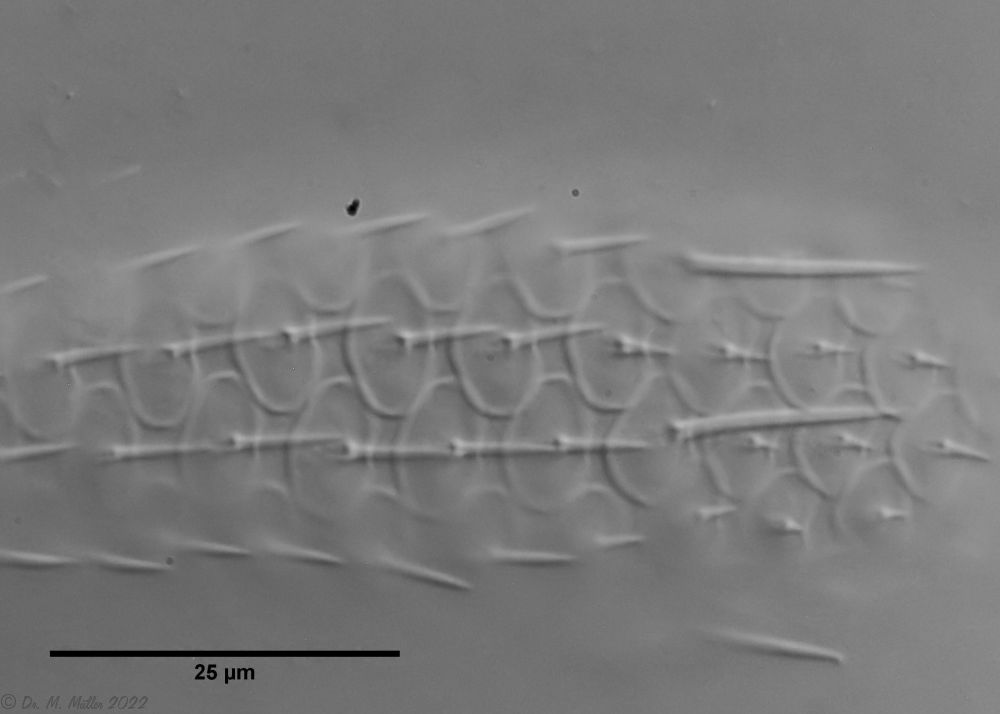 Ch. acanthocephalus: Macerated
Ch. acanthocephalus: Macerated
Literature:
(Vulkanov, 1937)Chaetonotus (P. ) acanthodes

124 µm - 159 µm
Width:
35 µm - 40 µm
Width of the head ( weakly five-lobed ):
µm
Length of the furca:
13 µm - 21 µm
Adhessive tubes:
75% of furca
Pharyx ( cylindrical, terminal swollen ):
31 µm - 39 µm
Diameter of the mouth ( round ):
8 µm
Dorsal scales:
10 rows of 20-25 strongly overlapping, rounded triangular scales (5 µm - 8.5 µm) with strongly convex margin (margin appears double) with short spines (7 µm); 7 - 12 simple girdle spines (6.5 µm - 16.5 µm) in alternating rows; scales behind spine girdle mostly without spines
Ventral scales:
4 elongated terminal plates with keel; 8-9 rows of small keel scales
Oecology:
Moor, on mud
Similar species:
well demarcated by spine belt and double scale edge
Particularities:
Spiked belt and double scale edge
A further representative of the subgenus Primochaetus is the small abdominal hardy Ch. (P.) acanthodes, which is notable for its distinct, spineless scales with a “double” anterior contour and a belt of long spines on the abdomen:
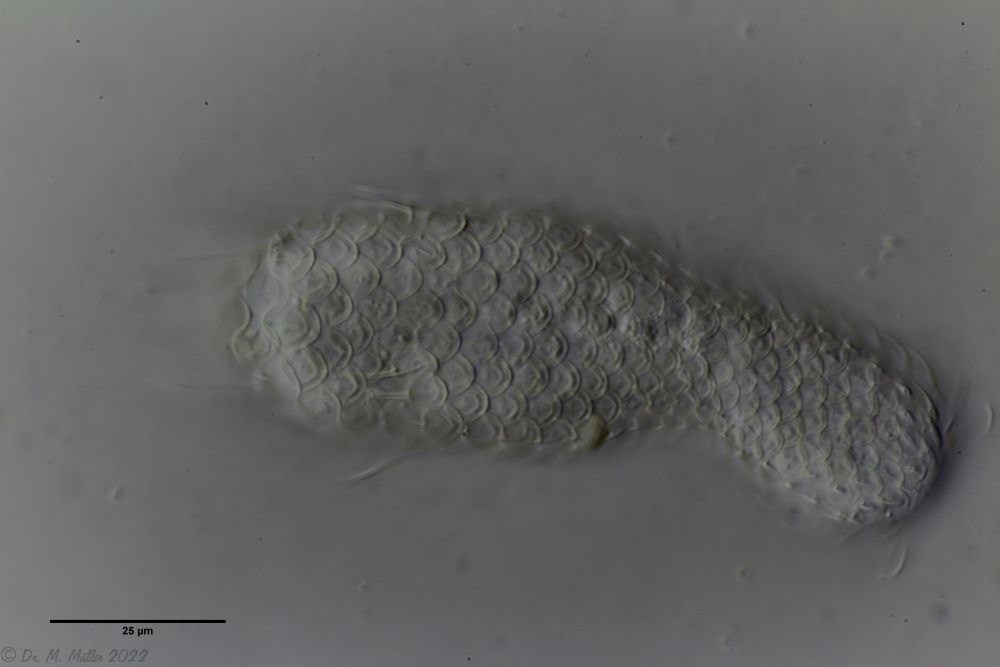 Ch. acanthodes: dorsal scales
Ch. acanthodes: dorsal scales
Only in the lateral view one recognizes that the spiny belt covers the entire dorsal side of the animal:
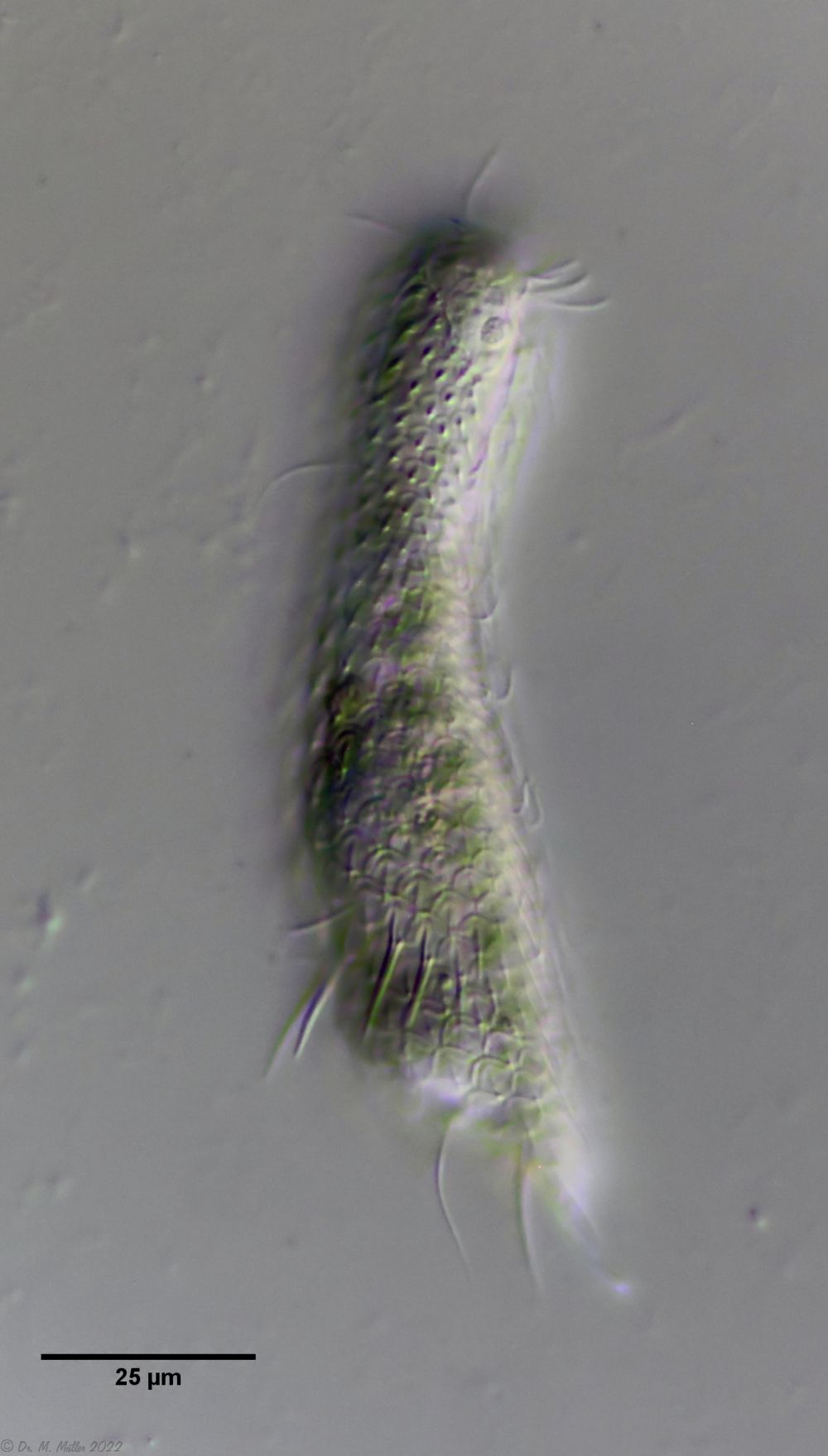 Ch. acanthodes: side view
Ch. acanthodes: side view
The ventral intermediate field is covered with approx. 8 rows of small, roundish keel scales. The rear end is formed by four rectangular, narrow keel plates:
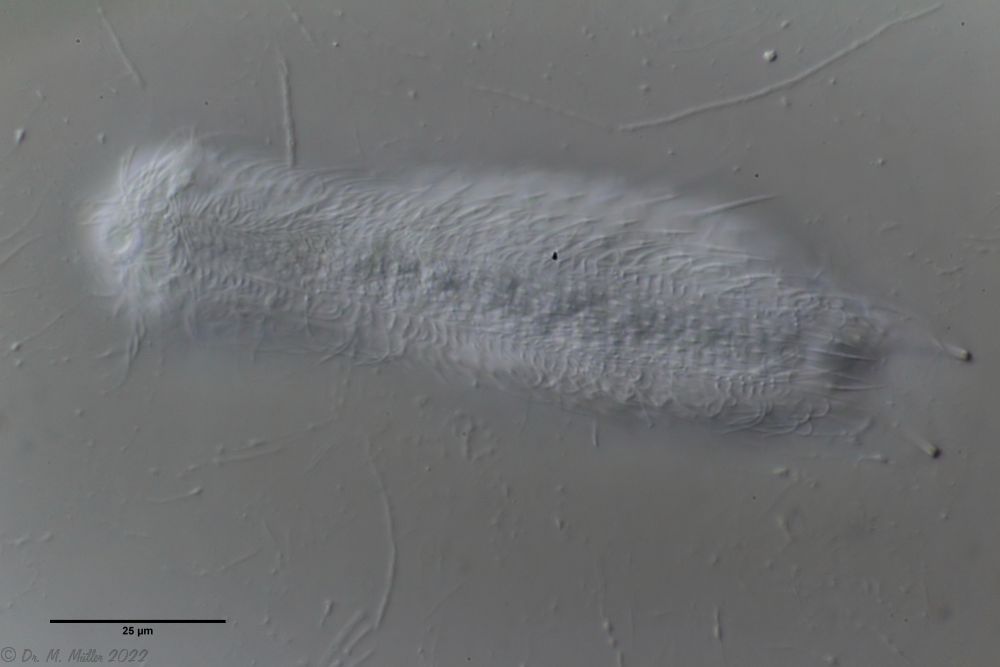 Ch. acanthodes: ventral scales
Ch. acanthodes: ventral scales
In cross-section, it becomes clear that the scales are strongly curved. This results in the “double contour” in the optical section. The animals I found have one or two teeth at the entrance to the pharynx:
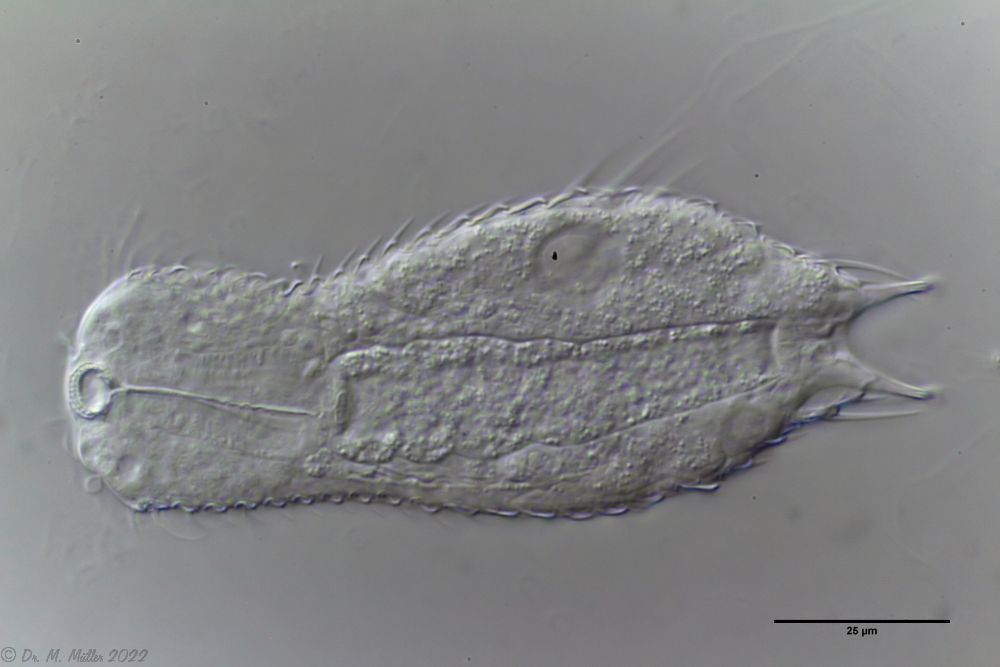 Ch. acanthodes: Cross-section
Ch. acanthodes: Cross-section
Literature:
(Stokes, 1887)Chaetonotus (P. ) armatus
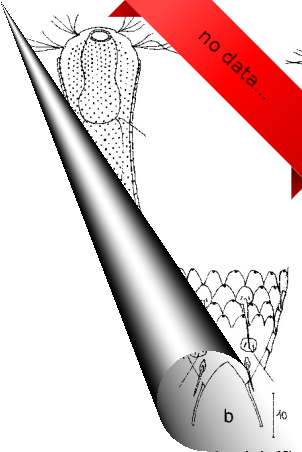
Width:
Width of the head ( fünflappig ):
µm
Length of the furca:
Adhessive tubes:
Pharyx ( zylindrisch ):
Diameter of the mouth ( rund ):
unknown
Chaetonotus (P. ) arquatus

Width:
Width of the head ( fünflappig ):
µm
Length of the furca:
Adhessive tubes:
Pharyx ( zylindrisch ):
Diameter of the mouth ( rund ):
unknown
Chaetonotus (P. ) brachyurus

Width:
Width of the head ( fünflappig ):
µm
Length of the furca:
Adhessive tubes:
Pharyx ( zylindrisch ):
Diameter of the mouth ( rund ):
unknown
Chaetonotus (P. ) chuni

Width:
Width of the head ( fünflappig ):
µm
Length of the furca:
Adhessive tubes:
Pharyx ( zylindrisch ):
Diameter of the mouth ( rund ):
unknown
Chaetonotus (P. ) cordiformis

190 µm - 225 µm
Width:
30 µm - 54 µm
Width of the head ( five-lobed ):
30 µm - 32.5 µm
Width of the neck:
20 µm - 21 µm
Length of the furca:
30 µm - 31 µm
Adhessive tubes:
75% of furca
Pharyx ( terminal slightly swollen ):
31 µm - 40 µm
Diameter of the mouth ( around ):
unknown
Dorsal scales:
7 rows of fe 20 thin, transverse-oval to obovate scales, only slightly touching each other; spines (10-39 µm) originate slightly behind scale center; secondary tip relatively far from distal end; three pairs of long lateral spines (34-46 µm) overhang toes by twice their length; between toes 3 dorsal spines slightly overhanging toes
Ventral scales:
Ventral intermediate field with +11 rows of short spiny tiny scales
Oecology:
Bog waters, among fallen leaves; common
Similar species:
C. (P. ) heideri : Spines are bent;
Particularities:
brood care: decorating the eggs with detritus; var. bernensis has no secondary tips
Ch. cordiformis shows in cross section the typical structure of limnic gastrotrichs. Remarkable are the relatively few, long and strongly curved scale spines:
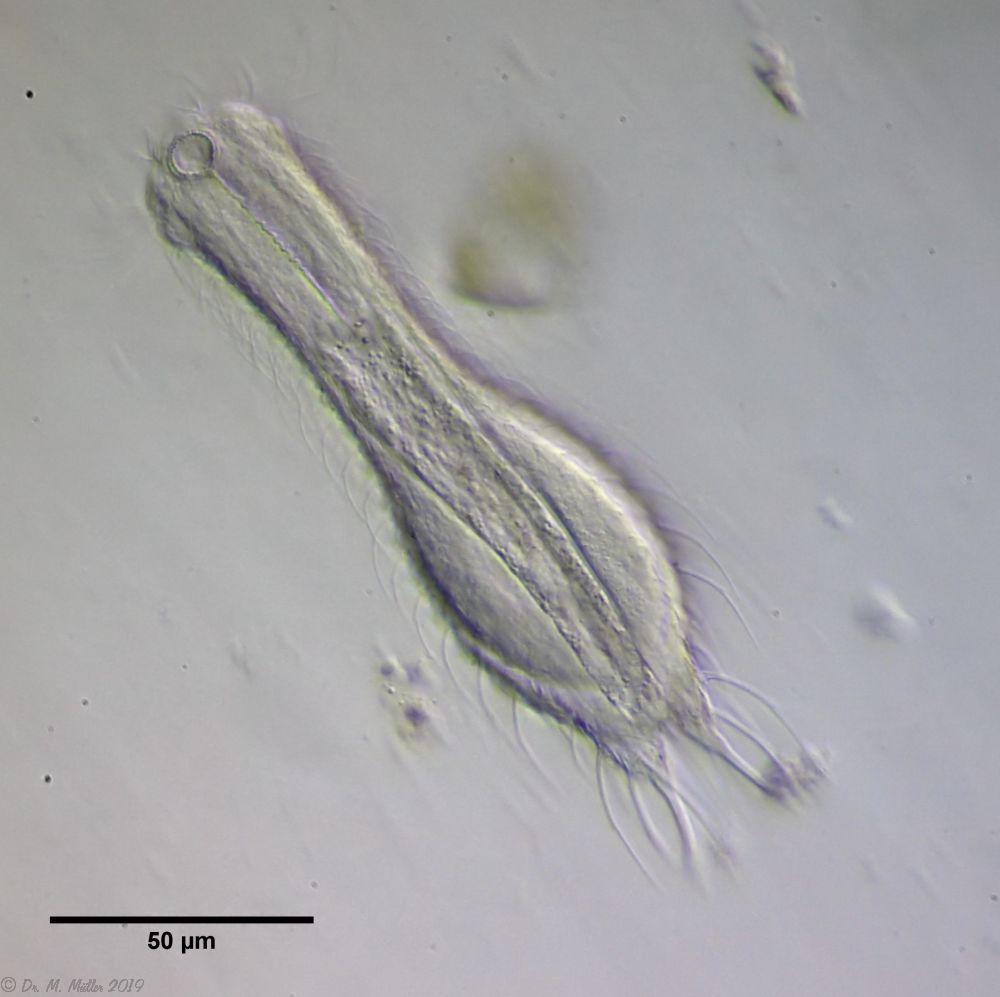 Ch. cordiformis: cross section
Ch. cordiformis: cross section
The side view shows the enormous length of the spines which are provided with a secondary tip:
Lateral view(ChCordiformis2.jpg) Ch. cordiformis: side view
These long spines make it very difficult to take good photos of the animals, because pinning them down with the coverslip strongly disturbs the natural arrangement of the spines. Therefore, an attempt should be made to capture the appearance of the animals free-swimming:
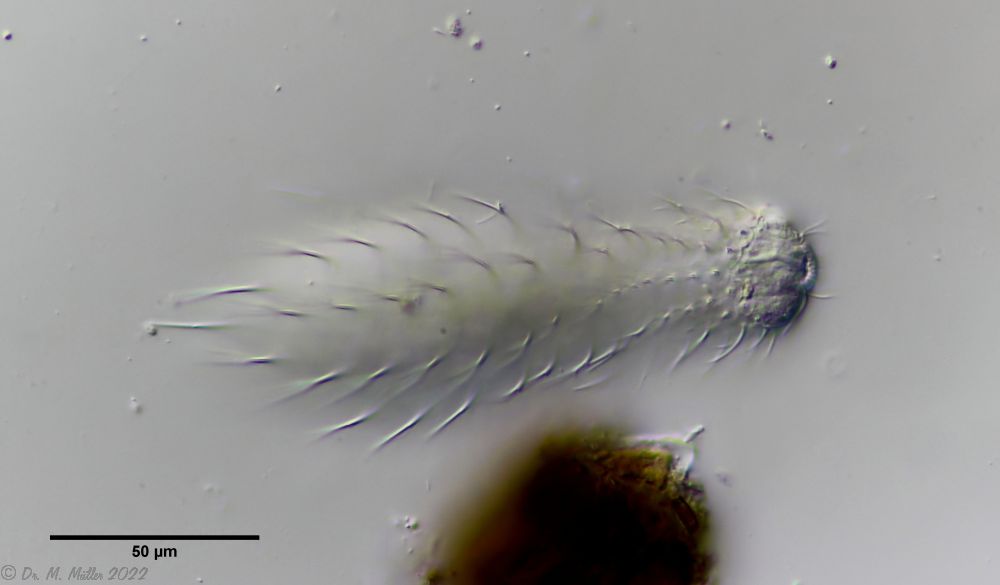 Ch. cordiformis: free swimming specimen with focus on the scale spines
Ch. cordiformis: free swimming specimen with focus on the scale spines
High resolution images are only possible with somewhat pressed specimens. Only here the roundish scale shape with the scale spines provided with a secondary tip becomes visible. The secondary tip sits relatively far away from the spine end of the animals.
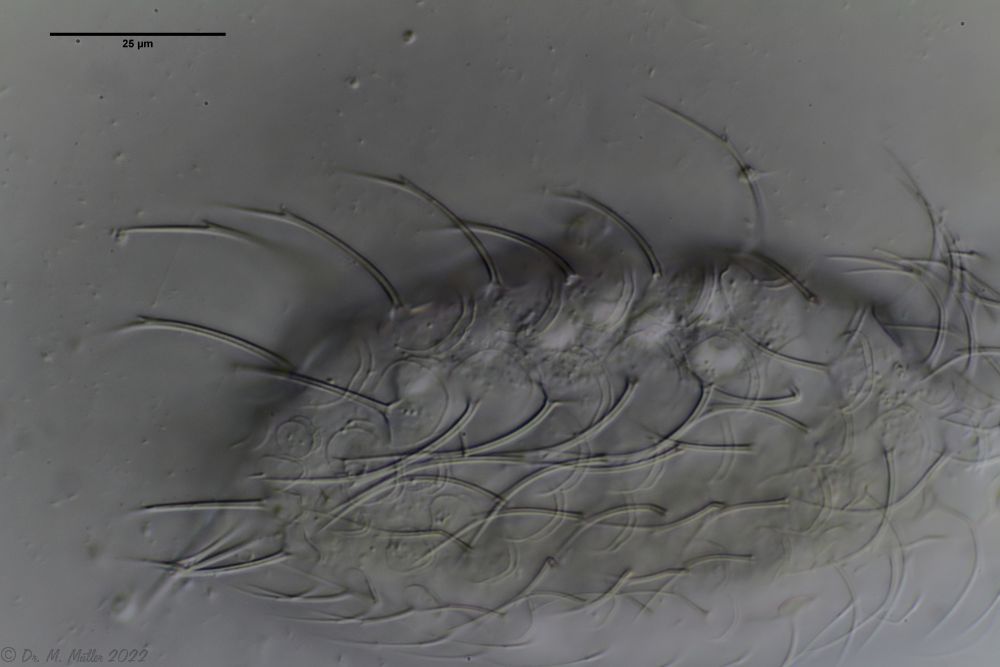 Ch. cordiformis: spiny scales with secondary tip.
Ch. cordiformis: spiny scales with secondary tip.
Many of the specimens found had peculiar spherical bodies inside, which I think are (permanent forms? of) parasites:
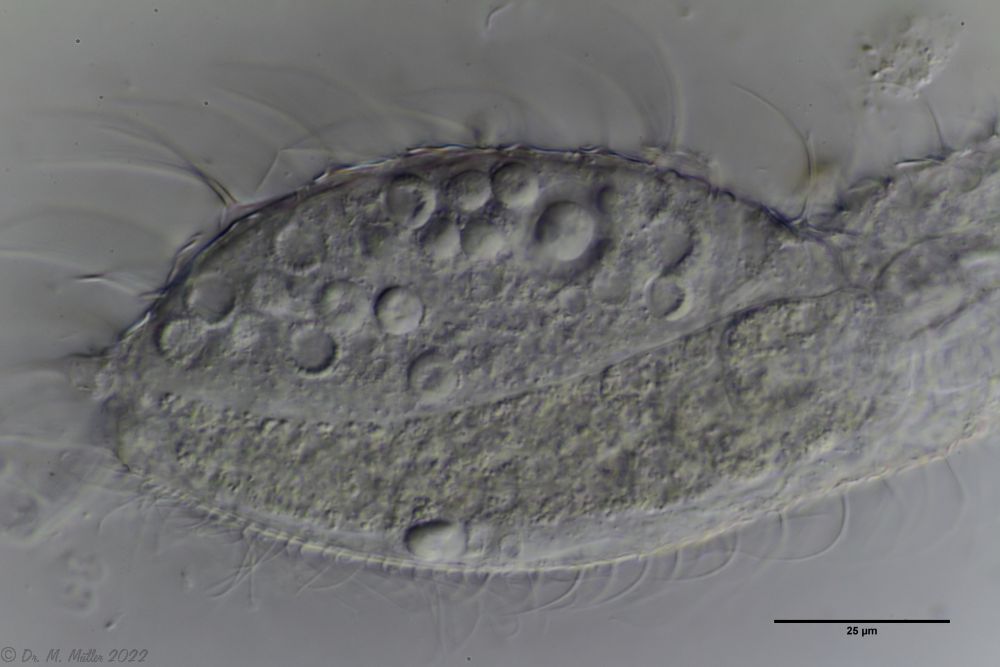 Ch. cordiformis: spherical inclusions.
Ch. cordiformis: spherical inclusions.
The scales of the animals can be judged well only after they are detached. Here you can recognize the name-giving “heart shape” of the roundish scales with an indentation:
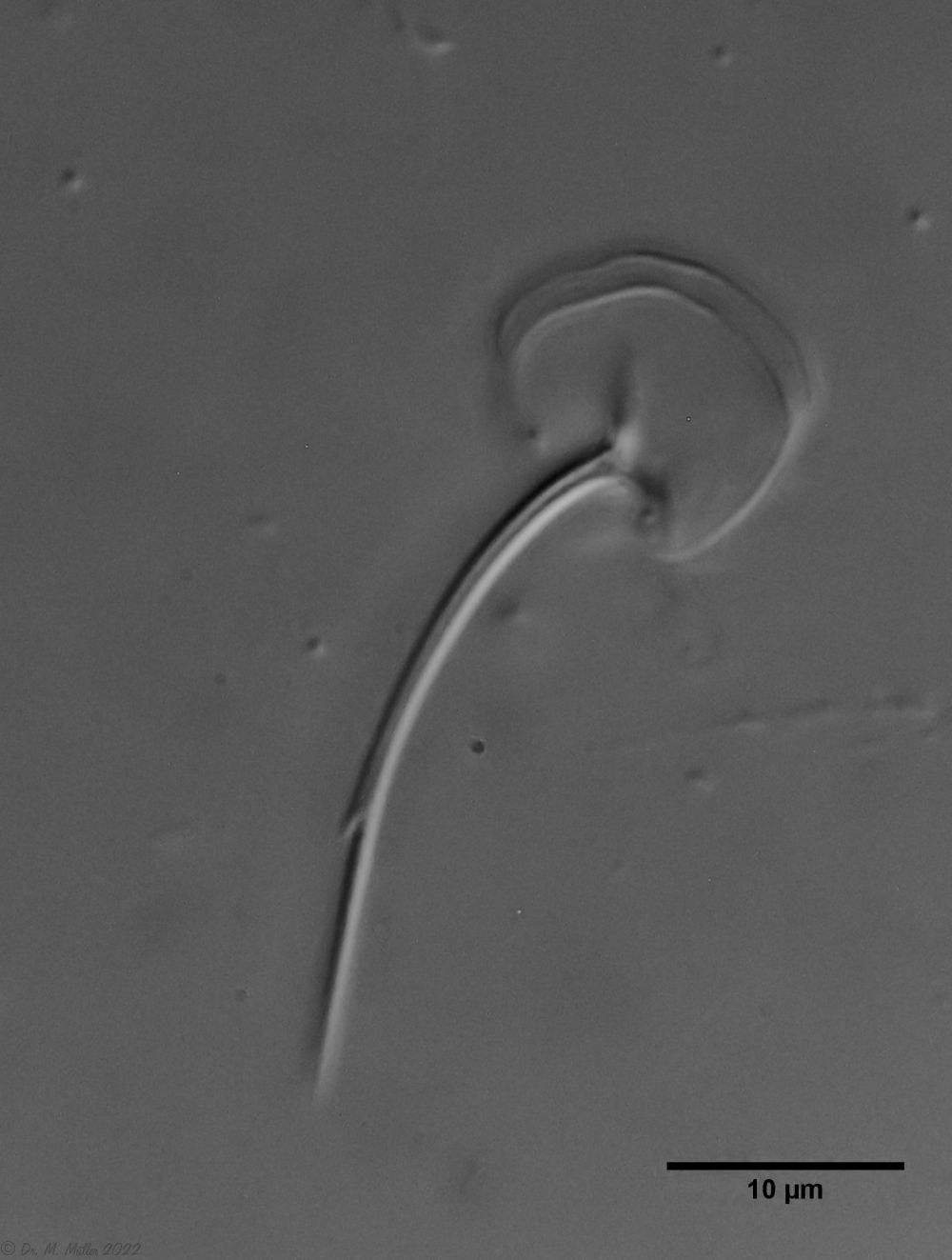 Ch. cordiformis: heart-shaped scales
Ch. cordiformis: heart-shaped scales
Ch. cordiformis is one of the few gastrotrichs that performs a kind of “brood care” after egg laying. After oviposition, the mother transports detritus from the vicinity of the oviposition site in her pharynx to the egg and sticks this material to the eggshell. As a result, the eggs are completely covered by detritus and protected by it from enemies:

Ch. cordiformis: brood care - start movie by clicking.
Literature:
(Greuter, 1917)Chaetonotus (P. ) dubius

Width:
Width of the head ( fünflappig ):
µm
Length of the furca:
Adhessive tubes:
Pharyx ( zylindrisch ):
Diameter of the mouth ( rund ):
unknown
Chaetonotus (P. ) erinaceus

Width:
Width of the head ( fünflappig ):
µm
Length of the furca:
Adhessive tubes:
Pharyx ( zylindrisch ):
Diameter of the mouth ( rund ):
unknown
Chaetonotus (P. ) heideri

Width:
Width of the head ( fünflappig ):
µm
Length of the furca:
Adhessive tubes:
Pharyx ( zylindrisch ):
Diameter of the mouth ( rund ):
unknown
Chaetonotus (P. ) heteracanthus

Width:
Width of the head ( fünflappig ):
µm
Length of the furca:
Adhessive tubes:
Pharyx ( zylindrisch ):
Diameter of the mouth ( rund ):
unknown
Chaetonotus (P. ) macrolepidotus

Width:
Width of the head ( fünflappig ):
µm
Length of the furca:
Adhessive tubes:
Pharyx ( zylindrisch ):
Diameter of the mouth ( rund ):
unknown
Chaetonotus (P. ) mutinensis

Width:
Width of the head ( fünflappig ):
µm
Length of the furca:
Adhessive tubes:
Pharyx ( zylindrisch ):
Diameter of the mouth ( rund ):
unknown
Chaetonotus (P. ) ploenensis

Width:
Width of the head ( fünflappig ):
µm
Length of the furca:
Adhessive tubes:
Pharyx ( zylindrisch ):
Diameter of the mouth ( rund ):
unknown
Chaetonotus (P. ) rectaculeatus

Width:
Width of the head ( fünflappig ):
µm
Length of the furca:
Adhessive tubes:
Pharyx ( zylindrisch ):
Diameter of the mouth ( rund ):
unknown
Chaetonotus (P. ) rotundus

Width:
Width of the head ( fünflappig ):
µm
Length of the furca:
Adhessive tubes:
Pharyx ( zylindrisch ):
Diameter of the mouth ( rund ):
unknown
Chaetonotus (P. ) scoticus

Width:
Width of the head ( fünflappig ):
µm
Length of the furca:
Adhessive tubes:
Pharyx ( zylindrisch ):
Diameter of the mouth ( rund ):
unknown
Chaetonotus (P. ) scutulatus

Width:
Width of the head ( fünflappig ):
µm
Length of the furca:
Adhessive tubes:
Pharyx ( zylindrisch ):
Diameter of the mouth ( rund ):
unknown
Chaetonotus (P. ) soberanus

Width:
Width of the head ( fünflappig ):
µm
Length of the furca:
Adhessive tubes:
Pharyx ( zylindrisch ):
Diameter of the mouth ( rund ):
unknown
Chaetonotus (P. ) tenuis

Width:
Width of the head ( fünflappig ):
µm
Length of the furca:
Adhessive tubes:
Pharyx ( zylindrisch ):
Diameter of the mouth ( rund ):
unknown
Chaetonotus (P. ) tenuisquamatus

Width:
Width of the head ( fünflappig ):
µm
Length of the furca:
Adhessive tubes:
Pharyx ( zylindrisch ):
Diameter of the mouth ( rund ):
unknown